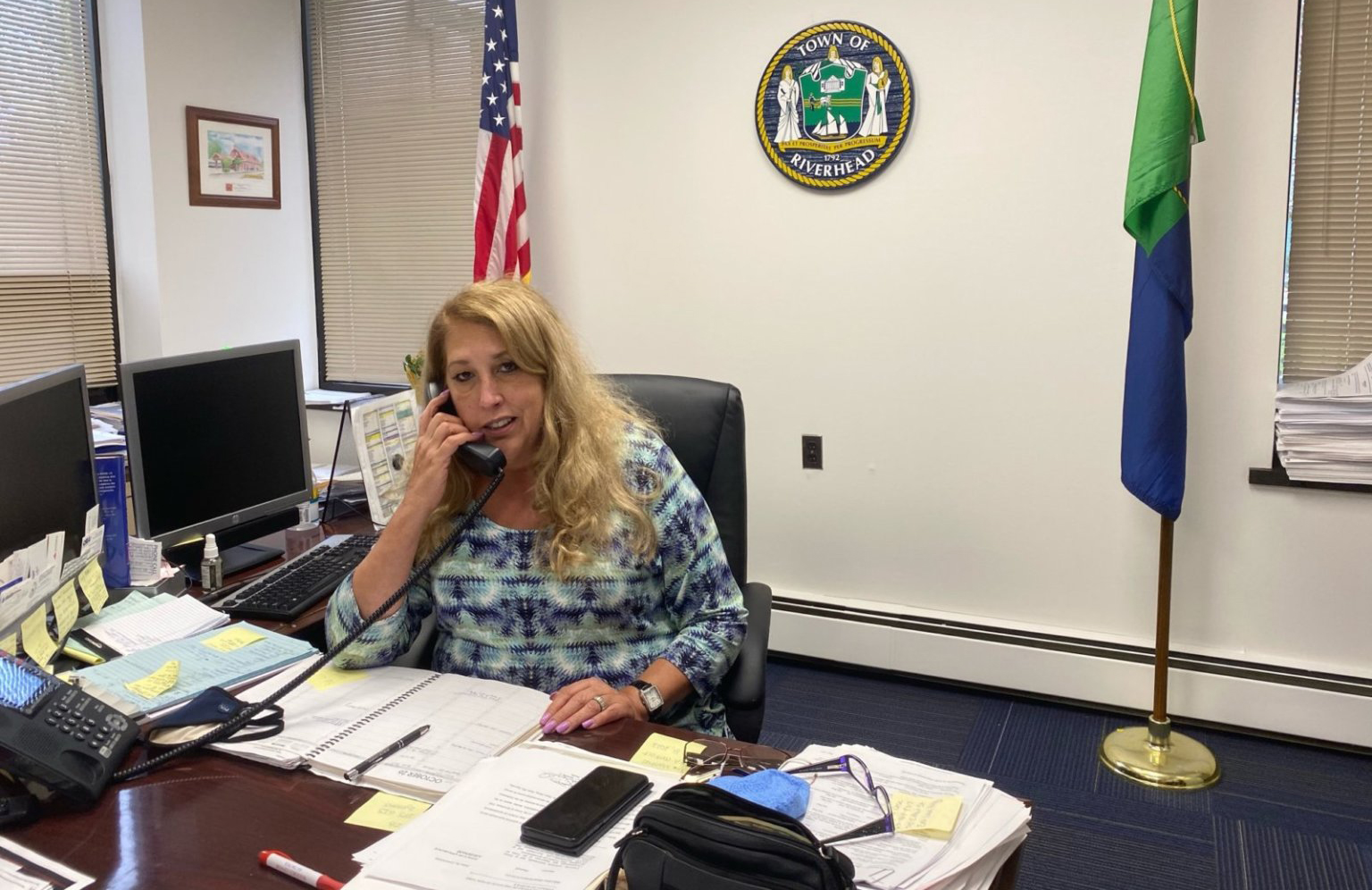Title 42 Tussle: Riverhead Emergency Declaration on Immigration Stokes Tensions

Riverhead Town Supervisor Yvette Aguiar has added her voice to the tumult, confusion and partisan grandstanding surrounding the expiration of Title 42, the policy that had allowed the U.S. to quickly deny entrance to migrants seeking asylum at the southern border.
On May 16, Aguiar declared a state of emergency with the express purpose of preventing migrants and asylum seekers from being sheltered in the town. Title 42, which had been in place since the pandemic began in March 2020, officially ended at one minute before midnight on the evening of May 11. As Title 42 expired, a swell of asylum seekers landed in New York City, straining the city’s resources and stoking fears that some would ultimately be transported to the East End.
While no local, New York State or federal agency has directly or implicitly confirmed plans to transport asylum seekers to any location on Long Island, including anywhere on the East End, Aguiar’s emergency declaration has turned into a political football.
“Tonight, based on information received, and in response to reports that the New York City Department of Homeless Services has, or will be arranging for the transportation and relocation of undocumented migrants and/or asylum seekers to hotels or motels within the Town of Riverhead, Supervisor Aguiar declared a State of Emergency,” Aguiar’s office said in a statement on May 16.
Aguiar’s office has not provided further documentation clarifying her statement. In fact, some local media organizations have spent the week since her declaration actively investigating and fact-checking her claims that Riverhead would soon be facing an onslaught of Title 42 migrants shipped in from the city.
In interviews with media outlets, Aguiar has cited a radio broadcast and a subsequent conversation with Guardian Angels founder and former New York City Republican mayoral candidate Curtis Sliwa as one of her primary sources.
“There are a number of locations in Riverhead, in which speculators, landowners, owners of SROs, hotels, buildings that are not fully occupied, have reached out to Eric Adams’ administration and they are saying they will accept illegals,” Sliwa said on the broadcast.
Aguiar’s declaration adds: “The mayor of New York City or designees acting on his behalf have contacted hotels and motels located within the town of Riverhead to assess availability of such facilities for delivery of migrants from New York City.”
While the fact pattern cited by Aguiar as the genesis for her emergency declaration remains murky, the political nature of the declaration itself is crystal clear.
“The federal government has failed or refused to anticipate, appreciate and react to the volume of migrants overwhelming the southern border and has failed to defend the sovereignty of the nation, resulting in thousands of migrants and asylum seekers crossing the U.S. border virtually unchecked,” the declaration reads. “Certain states located on the southern border have pled for, but have not received adequate assistance from the federal government.”
Immigration advocates were alarmed by the declaration.

“Someone can make a statement about what the federal government should or shouldn’t do,” says Minerva Perez, executive director of Organización Latino Americana of Eastern Long Island (OLA). “But declaring a state of emergency and creating a level of fear and anger and upset based on what facts? That’s the question to focus on right now.”
While stopping short of directly threatening legal action against the emergency declaration, Perez notes that the OLA, a nonprofit Latino-focused advocacy organization representing all five East End towns, has serious concerns.
“We are working with our general counsel and looking into all the things that led up to Aguiar issuing this state of emergency,” Perez says. “Did she misuse the law potentially for political gain? And if that did happen, it clearly points to a discriminatory focus by saying that immigrants and asylum seekers are the ones that you’re barring.”
On May 23, Perez joined fellow immigration and community activists, elected officials and candidates for local office at the Suffolk County Legislature in Hauppauge to, “denounce Republican-led efforts in the Legislature to deny asylum seekers basic human rights, including housing and other supports.”
The press event was in response to a contentious May 21 meeting, wherein Suffolk County Republicans, spurred by Aguiar’s emergency declaration, announced their efforts to pass a resolution that would seek to hire outside legal counsel to explore options that would prevent asylum seekers from being housed or supported anywhere in Suffolk.
“This is not an anti-immigration stance,” said Republican Suffolk County Legislator Kevin McCaffrey. “We recognize we are a country of immigrants. This is about the failed immigration policies of the federal government. We do not know who is going to be sent into this county, but we do know that [Suffolk] has no way to provide for their food, shelter, medical or schooling costs.”
The Suffolk County Democratic Committee got into the act with a news release of its own, which said, in part: “Suffolk County deserves better than the Republican Legislature’s shameful efforts to score cheap political points by exploiting the migrant crisis… We cannot stand silent while human suffering and the desire for freedom is reduced to a political prop to gain a few votes in a local election.”
In an effort to show at least some bipartisan consensus among its members, the Suffolk County Supervisors Association released a carefully worded statement from Chairman Rich Schaffer, who is also Babylon town supervisor, and Vice Chair Angie Carpenter, who leads the Town Islip.
“The Suffolk County Supervisors Association wants it understood that the issue regarding migrants and their placement in New York State is the sole responsibility of our federal government officials,” it said. “The president, and both Houses of Congress. They all need to step up, stop finger pointing and finally figure out how to handle this issue. Fix the system like we have been asking them to do for years. It should not, and cannot be left to local governments to shoulder this burden, or take on the responsibility for this issue.”
The statement was circulated to and signed off on by the offices of all 10 town supervisors in Suffolk, including all five supervisors on the East End. While the messaging on immigration as galvanized by Aguiar’s emergency declaration is replete with partisan rancor from both sides of the aisle, the one thing the two sides seem to be able to come to a consensus on is that it’s all the federal government’s fault.
Though he describes himself as staunchly supportive of immigration, East Hampton Town Supervisor Peter Van Scoyoc worries about the strain on municipal resources an influx of asylum seekers might put on the East End — an area with notoriously inadequate affordable housing.
“This is really about resources,” Van Scoyoc says. “State and federal governments often put mandates on local governments without any funding, and we get stuck trying to make it work. In many cases, we don’t even have the housing we need to keep businesses viable and open five days a week.”
Van Scoyoc, who brings a more nuanced, less nakedly partisan perspective to the discussion, believes that a major source of the resentment and fear of immigrants — particularly among East Hampton’s white working class population — stems from economic frustration.
“My wife was a school teacher,” Van Scoyoc says. “I’ve seen immigrant kids come through the schools and flourish and become really important members of our community. They join the EMS and the fire departments, and they’re in the local businesses and becoming teachers. That’s the way it should be. They’re contributing and they’re making us stronger.”
“But we’re struggling now,” he continues. “Working-class people are getting squeezed by the rise in housing values. In a way, they’re the migrants now. They’re being pushed out of this community and trying to find a better life where they don’t have to work three jobs and live in some basement.”
“The gap between the wealthiest people and everybody else keeps getting bigger and bigger,” Van Scoyoc laments. “It’s just not sustainable.”



